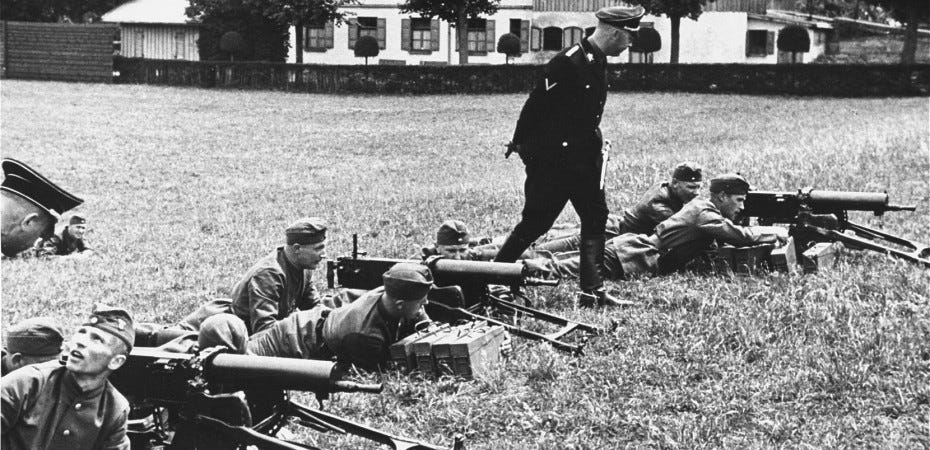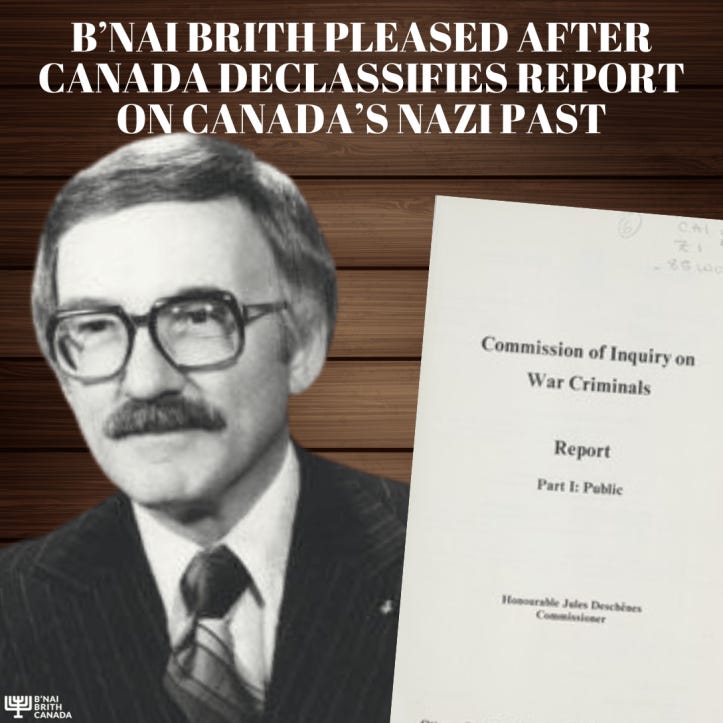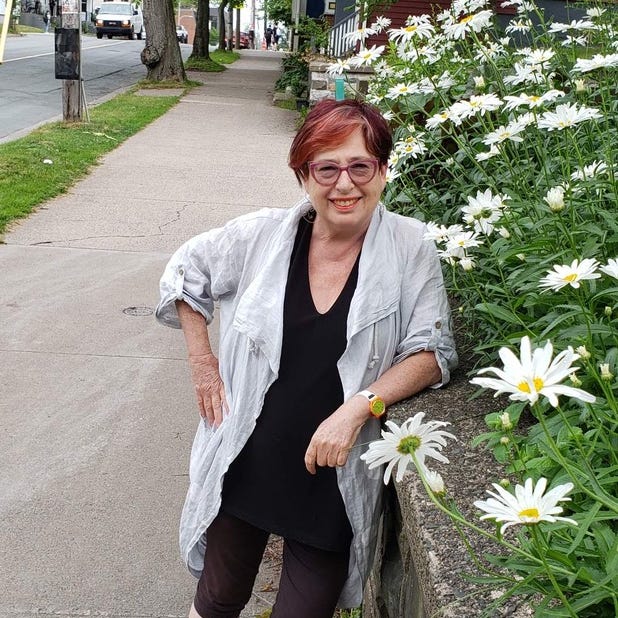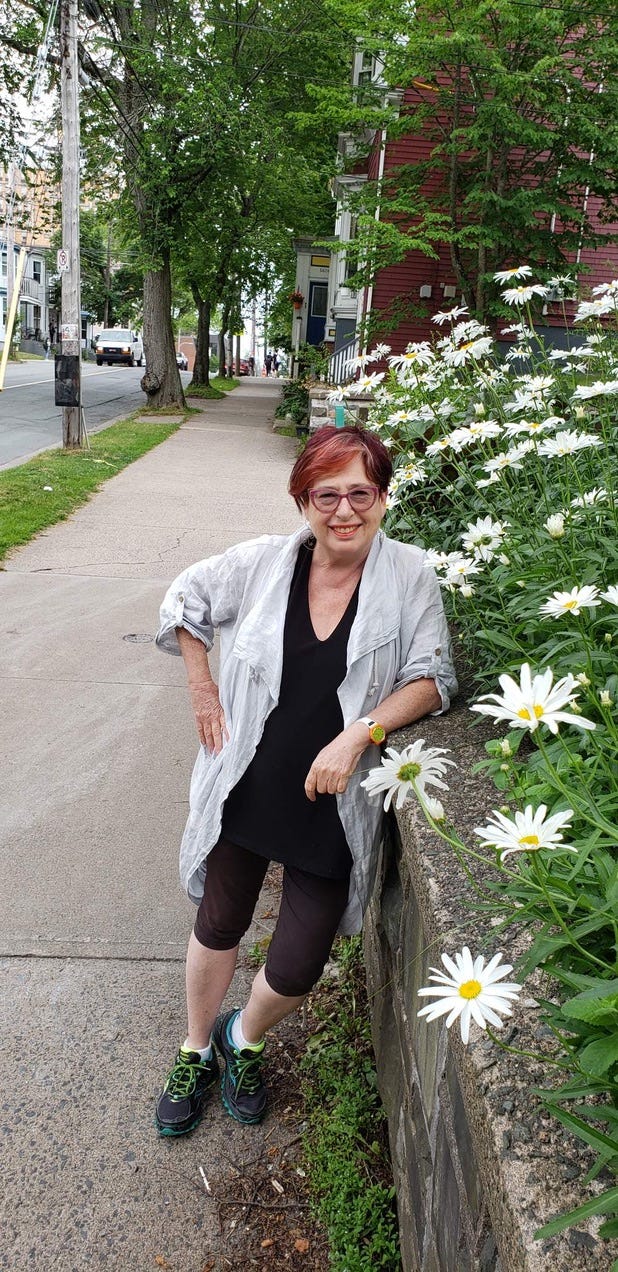In four days, we will celebrate the first anniversary of the debacle caused by the appearance of a special guest at Canada’s House of Commons. The guest was an actual Nazi who received two standing ovations by all members of the House of Commons, as he waved from the gallery. At the time, the Liberal government likely wanted to show Canada’s support for Ukraine against Russia in the 2.5 year long war. At the time it seemed important (at least to the government) to welcome and parade this older Ukrainian fighter – since he fought the “bad guys” in World War II. But his bad guys were our good guys.
Yaroslav Hunka, at age 98, stood in the gallery as he was presented to the Commons as a war hero. Standing proudly beside Prime Minister Trudeau that afternoon on the front bench was Ukrainian president Volodymyr Zelenskyy. They, along with most of Canada’s MPs, were listening to Speaker of the House, Anthony Rota, who introduced Hunka who “fought against Russians, [was] a Ukrainian hero and a Canadian hero. We thank him for all his service.” Cut to thunderous applause.
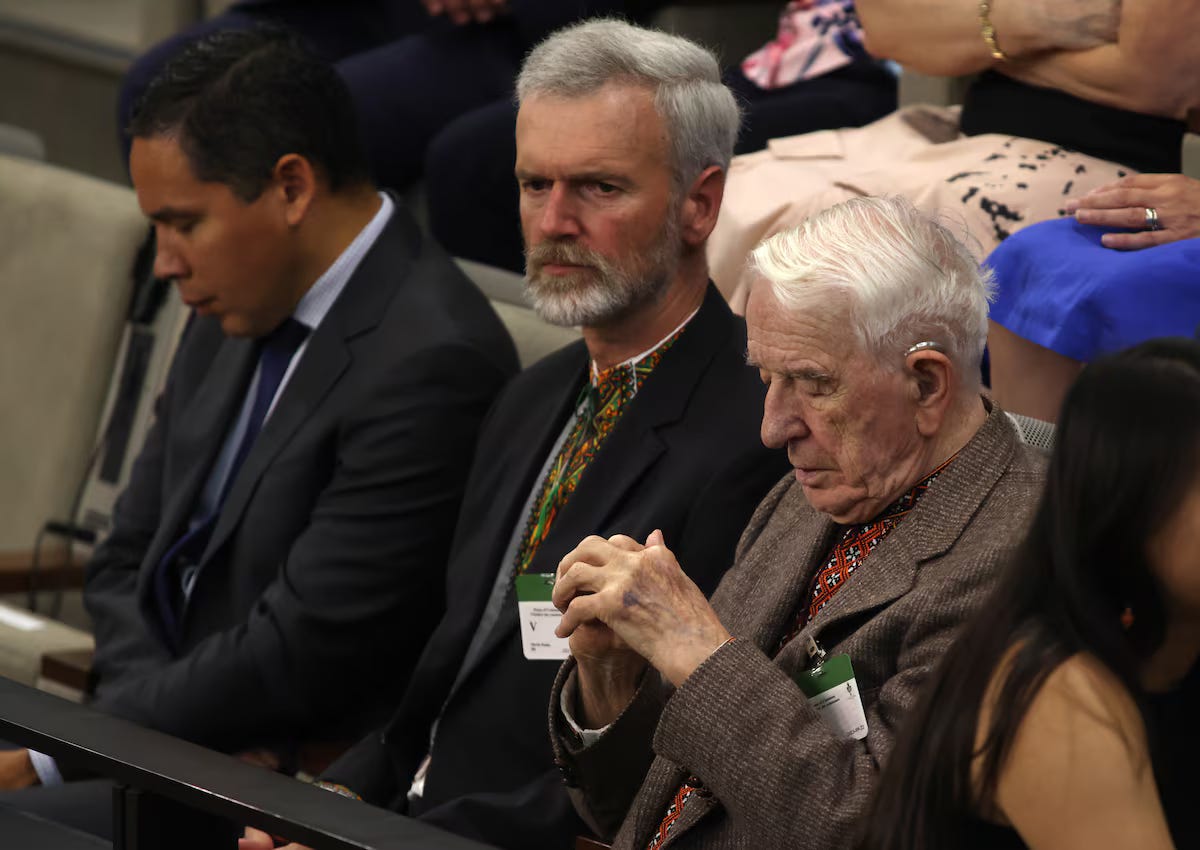
It turns out that Hunka’s service was that he, “defending his native Ukraine” fought with a Nazi unit, the 14th Waffen Grenadier Division of the SS (1st Galician). Anyone with doubts about Hunka’s history are reminded that 13 years earlier he had written an essay about his time with the Waffen SS that was published by an online US magazine that focused on Ukrainian war veterans. His unit, visited by top SS leader Heinrich Himmler in 1944, was responsible for several massacres of local people – Poles and Jews — including the 1944 Pidkamin Massacre, which killed nearly 1000 Polish civilians. Canadian historian John-Paul Himka notes that more than a quarter of Holocaust victims lived in what is now Ukraine. In his book, Ukrainian Nationalists and the Holocaust: OUN and UPA’s Participation in the Destruction of Ukrainian Jewry 1941-1944, Himka writes about Ukrainian nationalists’ destruction of Jewish communities under German occupation.
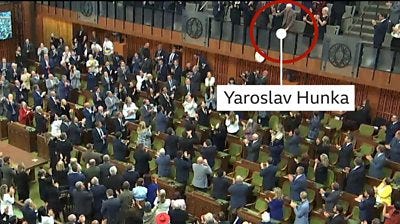
Some called the mistake of inviting Yaroslav Hunka a “failure of vetting”, others called for an apology; still others pointed out that anyone with even a rudimentary knowledge of history could have seen this coming a mile away. Of course, House Speaker Rota had to apologize and resign as Speaker. Meantime, Trudeau said it was a terrible mistake to have invited Hunka – but put the blame on Rota.
Truth be told, to compound the problem, the Ukrainian Canadian Congress (UCC) had asked Trudeau’s office to also invite Hunka to a private party with Trudeau and others in Toronto after the House of Commons event. Hunka received an invitation, though he did not attend.
Establishment Jewish Canadian organizations notably the Troika – the Centre for Israel-Jewish Affairs (CIJA) Friends of Simon Wiesenthal Centre and B’nai Brith correctly lamented the fact a Nazi was honoured in the Commons. They noted that records showed that 1882 members of the 14th Waffen SS emigrated to Canada in 1950, though Hunka arrived in 1954.
Here we are nearly a year later than Hunka’s appearance in the Commons. Library and Archives Canada (LAC) is now asking the federal government if LAC can release the names of the hundreds of people listed in a secret document from the 1986 Deschênes Commission. Forty years ago, Justice Jules Deschênes headed a commission that looked into the presence of Nazis, or Nazi collaborators and war criminals who had emigrated to Canada in the aftermath of World War II. Deschênes’ restricted list was more than 600 names of Canadians, some of Ukrainian background, while not charged with any crimes, were on the list of possible Nazi sympathizers or worse.
Though most of the 600 must be dead all these years since the Deschênes Report, clearly their families and loved ones do not want their relatives’ memories or their own tarnished. Of course anyone named cannot fight to clear their name if they are no longer alive.
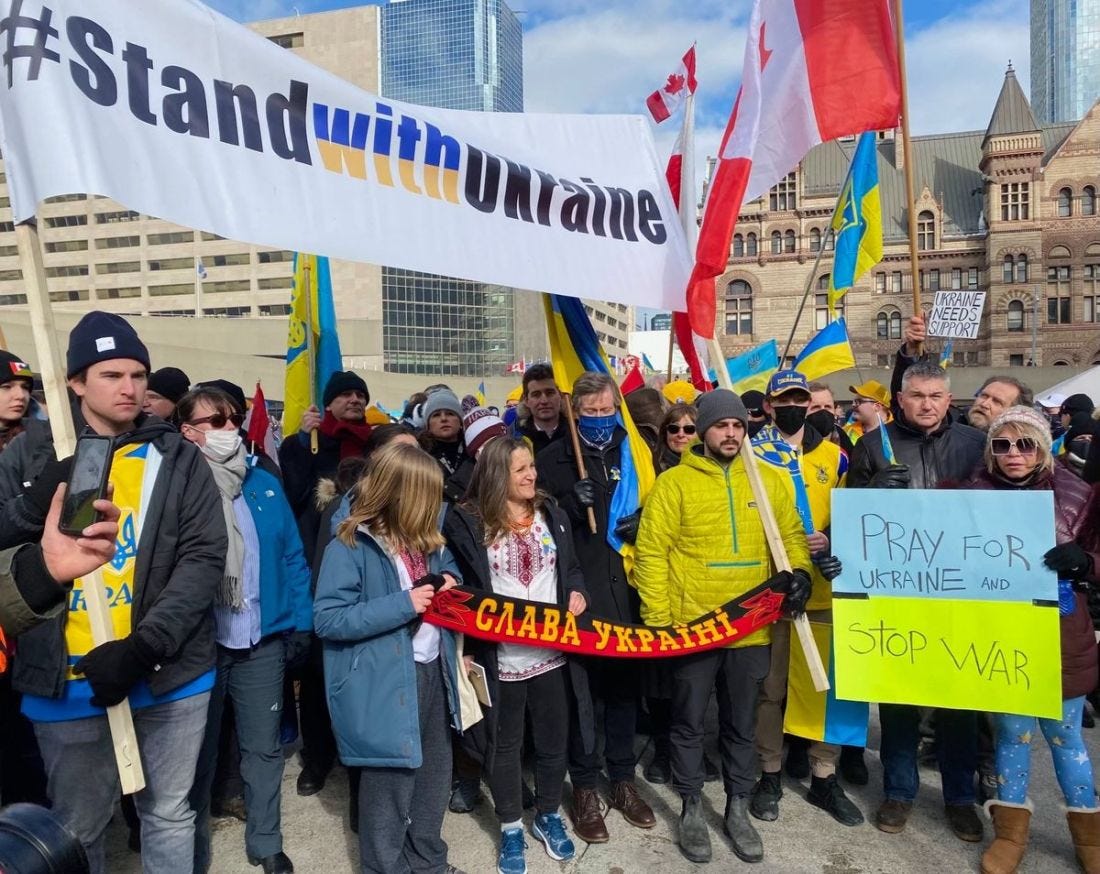
In1987, the establishment Jewish community demanded the “secret” list be divulged, though it never was. The late Sol Littman, a journalist and writer who, at the time, was the Canadian Director of the Simon Wiesenthal Centre, published a scathing article here. He noted that a key researcher hired by the Commission, historian Alti Rodal, had uncovered evidence of Nazi war criminals emigrating to Canada and settling here permanently. As an RCMP source attested at the time:
“It is reasonable to assume, given the situation in Europe following World War II regarding lost, destroyed, stolen and seized identity papers, that certain persons undoubtedly came to Canada under assumed identities. The fact we do not have certain war criminal’s names listed on our landing records does not preclude the possibility of certain of their numbers living in Canada under assumed identities.“
This was at odds with the Commission’s findings which downplayed the fact the Nazis were living here. As Littman put it,
“The Deschênes Commission was appointed to silence the hounds. It was designed to prove to the world that there was no significant gathering of war criminals in Canada, that there had been no collaboration with Nazis, no looking the other way on war crimes by Canadian officials. Or, in the words of Justice Deschênes, “Canadian policy on war crimes was not worse than that of several Western countries which displayed a lack of interest.”
When Rodal showed evidence of more than 1000 possible war criminals having entered Canada post-war, Deschênes insisted she was out by a magnitude of 400% and there were, rather, only 20 possible war criminals. He denied that the Waffen SS members who came to Canada posed a problem; Deschênes wrote:
“The Galicia Division [Waffen SS] should not be indicted as a group…, The members of the Galicia Division were individually screened for security purposes before admission to Canada. Charges of war crimes against members of the Galicia Division have never been substantiated… In the absence of evidence of participation or knowledge of specific war crimes, mere membership in the Galicia Division in insufficient to justify prosecution.”
Yet there was a lot of evidence to the contrary; evidence uncovered and presented by Rodal, who wrote a separate report. Though there was demand by the Jewish organizations to release her report, it wasn’t until February 2024 that the Rodal Report was released, at this point still minus the list of names.
The wider Jewish community which supported the release of the second part of the Deschênes report, didn’t make much of a fuss over the presence of Hunka and has backed away from a public campaign against the government.
How times have changed. At one point the institutional Canadian Jewish community wanted to expose the glut of war criminals silently admitted to Canada. However, last year’s Hunka fiasco has not drawn as much ire from Jews. Today, the institutional Jewish community seems to have different priorities. Gone is the drive to find and prosecute Nazi war criminals in Canada. Now the priority appears to be protection of Israel and the silencing of its critics; including those who support Palestinians. The establishment Jewish community is dedicated to full support for Israel’s annihilation of Gaza.
Image at the top:
Heinrich Himmler inspects Waffen-SS troops, early 1940s. This image is from an album of SS photographs from the US Holocaust Memorial Museum.
Share this:
Related
Why Did Canada’s MPs Laud Member of WWII Nazi Unit as a “hero”?September 25, 2023In "14th Waffen Grenadier Division"
The NDP has some ‘splaining to do– or some soul-searchingSeptember 26, 2023In "Azov Battalion"
The Heart of the Matter – why does the Canadian Jewish establishment conflate support for Palestine with antisemitism?May 27, 2021In "commentary"
Post navigation
PreviousPro-Israel supporters deny there is a Genocide in Gaza
Leave a comment
Write a comment...
Close
Comment
Judy Haiven is a writer and activist living in Halifax, Nova Scotia. Formerly, she was a professor in the Management Department of the Sobey School of Business at Saint Mary’s University and is a specialist in Industrial Relations. Judy Haiven is a founder of Equity Watch, a human rights organization dedicated to fighting bullying and discrimination in the workplace.
Contact: jhaiven [at] gmail.com
Sign up for my free newsletter:



